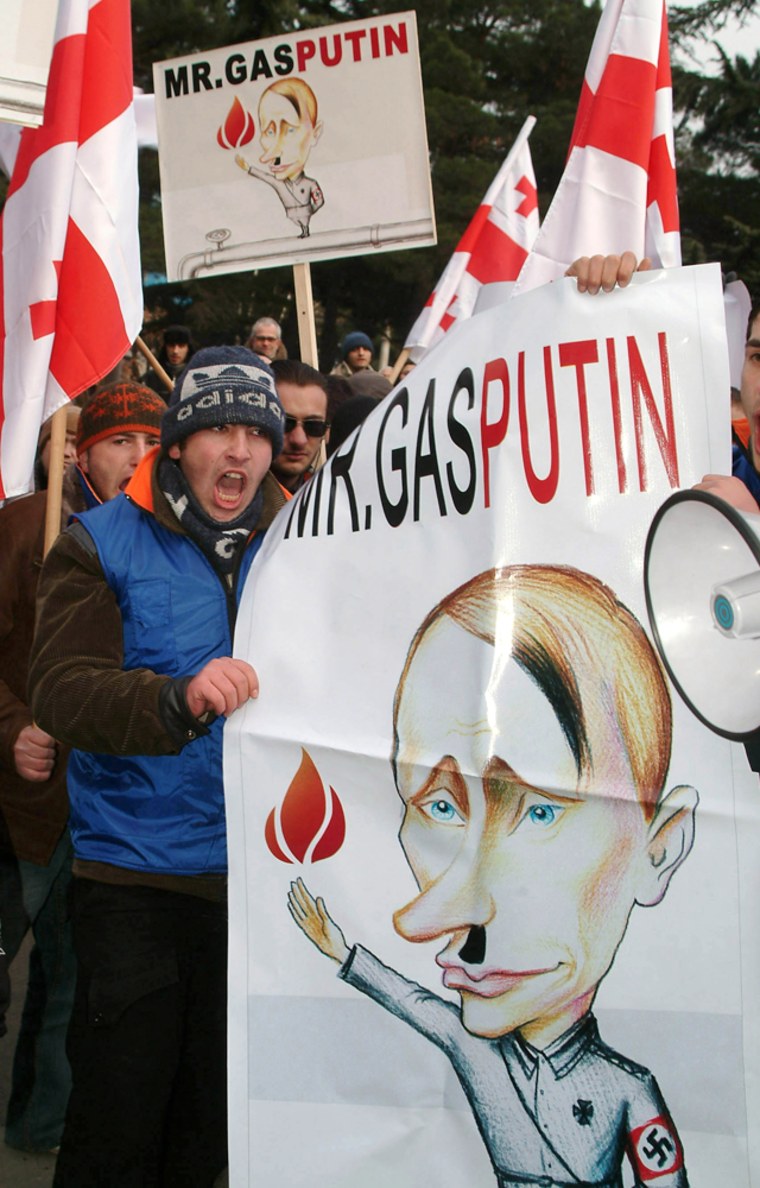Georgian President Mikhail Saakashvili accused Moscow of sabotage after explosions early on Sunday knocked out the main pipeline in southern Russia that supplies gas to Georgia and Armenia.
Russian officials blamed the blasts on anti-Moscow insurgents in its southern region of North Ossetia.
But Saakashvili, who has irritated the Kremlin by pushing his ex-Soviet state closer to the West, said he did not believe the Russian explanation and accused Moscow of cutting gas supplies and triggering an energy crisis just as sub-zero temperatures hit his tiny Caucasus state.
“This morning there was a serious act of sabotage on the part of Russia on Georgia’s energy system,” he told a news conference.
“Basically what happened is totally outrageous and we are dealing with an outrageous blackmail by people who do not want to behave in a civilized way,” Saakashvili later told Reuters.
He said he believed Russia was trying to force Georgia to surrender ownership of its domestic gas pipeline network to Moscow — the subject of long-running negotiations.
Neither he nor Georgian officials offered any evidence for his accusations.
The Russian Foreign Ministry, in a sharply worded statement, warned that Saakashvili’s remarks would have serious implications for relations between the two countries.
“The comments ... from Tbilisi cannot be described as anything other than hysterical and confused,” the ministry said in the statement, which was quoted by RIA news agency.
“It is as if all the members of the Georgian government are competing with each other to use this situation as an opportunity to crank up their anti-Russian campaign,” it said.
Alternate delivery route
Gas flow resumed in Georgia on Monday after energy officials said reserves were nearly exhausted.
The gas is coming from neighboring Azerbaijan which takes its gas via a separate pipeline from Russia.
Georgia, whose relations with Moscow have been prickly since a pro-West government took power two years ago, stepped up its allegations that Russia had deliberately cut off the gas, though officials have not so far offered any evidence.
“It was not by chance. It was a deliberate action against Georgia,” Georgian parliamentary speaker Nino Burdzhanadze told Russia’s Ekho Moskvy radio.
“I am more than sure that major Russian forces, including special services, are unfortunately interested in destabilizing the situation,” she added.
Two explosions
The pipeline to Georgia was knocked out overnight Saturday by two explosions in quick succession on two sections in a mountainous part of North Ossetia.
Local news agencies quoted unnamed Russian security officials as saying they suspected anti-Moscow insurgents, who periodically carry out attacks in the mainly Muslim Russian side of the Caucasus that includes Chechnya.
Saakashvili said Georgia was suffering the same fate as Ukraine, which had its supply of Russian gas cut off earlier this month in a contract dispute, in the process reducing supplies to major European states.
Ukraine’s pro-Western leadership had said Moscow was using its huge energy resources as a political weapon.
“I think the world should wake up to this kind of behavior. Yesterday it was Ukraine, today it is Georgia and tomorrow it might (reach) everywhere where Russia sells its gas and electricity,” said Saakashvili.
Russian officials said an explosion 120 miles away, also early on Sunday, had knocked out the high-voltage line through which Georgia imports extra electricity from Russia.
The temperature in the capital Tbilisi on Sunday was minus-23 degrees Fahrenheit, bitterly cold for a country known for its sub-tropical Black Sea seaside resorts.
Queues formed at shops selling kerosene, firewood and gas canisters. Schoolchildren were told to stay at home on Monday.
A spokeswoman for Armenia’s gas supplier said supplies from Russia had stopped but reserves were being used to supply consumers.
